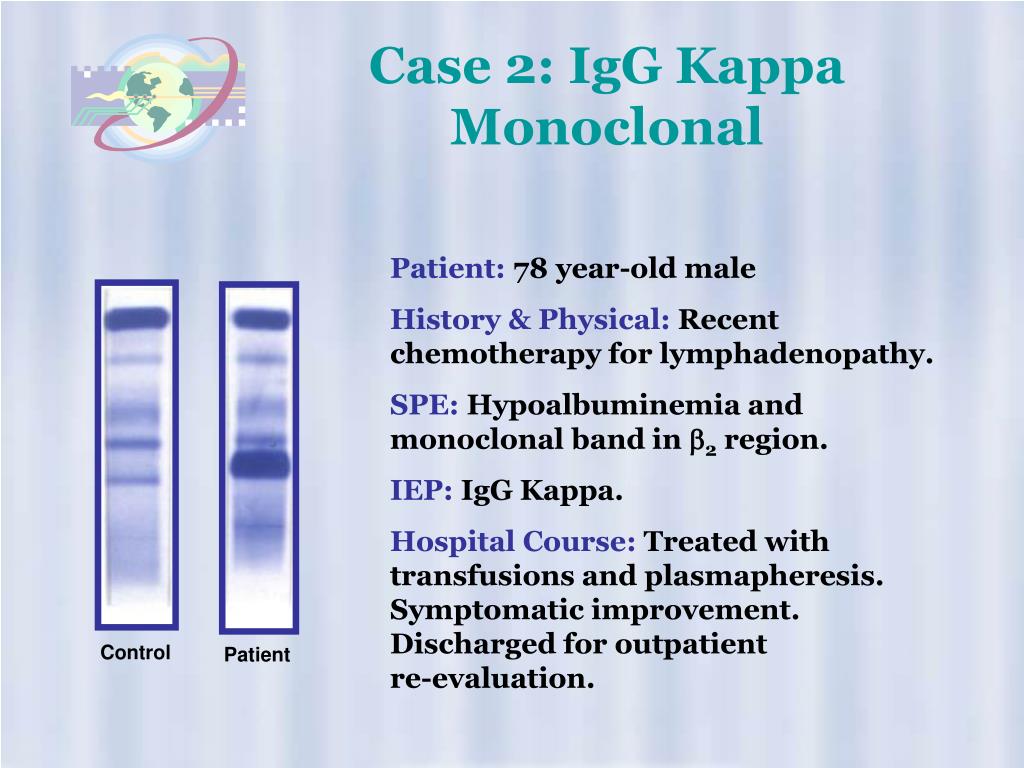A Faint Igg Kappa Monoclonal Immunoglobulin Is Detected
A Faint Igg Kappa Monoclonal Immunoglobulin Is Detected
Immunoglobulins are proteins produced by the immune system in response to a virus, bacteria, or other foreign substances. They act as antibodies, binding to the invading organisms and neutralizing them. Immunoglobulins come in several varieties, including IgM, IgG, and IgA. IgG is the most common type and is responsible for most of the body's immune defense. The presence of a faint igg kappa monoclonal immunoglobulin is an indicator of an active infection or a weakened immune system.
What Is an Igg Kappa Monoclonal Immunoglobulin?
An igg kappa monoclonal immunoglobulin is a type of immunoglobulin that is produced in response to an infection or other foreign substance. It is a subclass of IgG, which is the most common type of immunoglobulin. IgG is made up of two components: heavy and light chains. In an igg kappa monoclonal immunoglobulin, the heavy and light chains are of the same type. This is why it is referred to as a monoclonal immunoglobulin.
What Causes a Faint Igg Kappa Monoclonal Immunoglobulin?
A faint igg kappa monoclonal immunoglobulin can be a sign of a number of different conditions. It can be caused by a virus, bacteria, or other foreign substances, such as a drug or a vaccine. It can also be caused by a weakened immune system due to age, illness, or other factors. In some cases, a faint igg kappa monoclonal immunoglobulin may be caused by a tumor.
What Are the Symptoms of a Faint Igg Kappa Monoclonal Immunoglobulin?
The symptoms of a faint igg kappa monoclonal immunoglobulin can vary depending on the underlying cause. Generally, symptoms may include fatigue, fever, and swollen lymph nodes. Additionally, some individuals may experience joint pain, rash, or confusion. In severe cases, a faint igg kappa monoclonal immunoglobulin may cause anemia, low blood cell counts, or other serious complications.
How Is a Faint Igg Kappa Monoclonal Immunoglobulin Diagnosed?
A faint igg kappa monoclonal immunoglobulin is usually diagnosed with a blood test. The test measures the levels of immunoglobulin in the blood. If the levels are abnormally low, it may indicate a faint igg kappa monoclonal immunoglobulin. Other tests, such as a CT scan or a biopsy, may be used to confirm the diagnosis and rule out other conditions.
What Are the Treatment Options for a Faint Igg Kappa Monoclonal Immunoglobulin?
The treatment for a faint igg kappa monoclonal immunoglobulin depends on the underlying cause. If it is caused by a virus or bacteria, antibiotics may be prescribed. If it is caused by a weakened immune system, medications to boost the immune system may be prescribed. In cases of a tumor, surgery or radiation may be necessary.
Conclusion
A faint igg kappa monoclonal immunoglobulin is an indicator of an active infection or a weakened immune system. It is usually diagnosed with a blood test and the treatment depends on the underlying cause. If it is caused by a virus or bacteria, antibiotics may be prescribed, while medications to boost the immune system may be prescribed in cases of a weakened immune system. In cases of a tumor, surgery or radiation may be necessary.
PPT - High Resolution Protein Electrophoresis PowerPoint Presentation

What is your approach to a patient who is referred for an

Tìm hiểu xét nghiệm định lượng chuỗi nhẹ tự do FLC Kappa & Lambda
